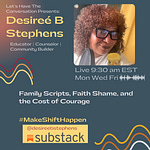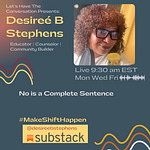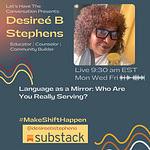One of the biggest lies we’ve been told is that accountability is about punishment. That to be accountable means to be shamed, exiled, or stripped of dignity. That to hold someone accountable means to make an example out of them.
But true accountability is not about blame—it’s about transformation.
Supremacy culture teaches us that punishment is the only way to address harm, but what if we built systems of accountability that centered healing instead of fear? What if we moved beyond reactionary cycles of harm and instead designed processes that foster repair, trust, and long-term change?
Today, we explored how to build community-centered accountability that doesn’t replicate the very systems we’re trying to dismantle.
Lessons & Community Input
This conversation challenged the mainstream narratives about accountability, harm, and repair. Some key takeaways:
✅ Accountability is a practice, not a punishment—it should lead to transformation, not exile.
✅ Without clear accountability processes, harm often gets ignored or dismissed, eroding trust.
✅ True accountability is community-centered—it includes those impacted, those who caused harm, and the broader collective.
✅ Healing-based accountability prioritizes restorative justice, transparency, and structural change.
✅ Fear of accountability is rooted in supremacy culture—when we shift that fear, we create space for actual growth.
If today’s conversation resonates, now is the time to deepen your commitment to community accountability.
Upgrade to a paid subscription for exclusive tools, extended reflections, and deeper conversations on sustainable justice. If finances are a barrier, email Scholarships@DesireeBStephens.com.












